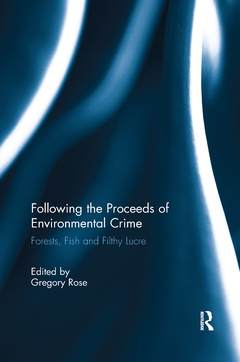Following the Proceeds of Environmental Crime Fish, Forests and Filthy Lucre
Coordonnateur : Rose Gregory

Huge quantities of natural resources are illegally harvested and their proceeds laundered in the Asia-Pacific region, fostering corruption and undermining environmental governance. Most illegal exploitation and pollution occurs in countries with poor governance capacities, but much of the sale for profit and money laundering occurs in mature markets with well-developed governance capacities. Their asymmetrical enforcement capacities can complement each other.
This book explores ways to combat illegal fishing and logging in Asia-Pacific region by the use of cooperative legal measures, particularly anti-money laundering and confiscation of proceeds techniques. Contributors to this volume cover themes including: the nature of transnational environmental crime; patterns in laundering of illicit fish and forest products; networks for distribution of illicit products; weaknesses in current systems for assurance of the legality of products; and international legal cooperation to enforce anti-money laundering laws in relation to illicit products. In considering these topics the book explores how the innovative use of anti-money laundering measures and the seizure of criminal proceeds can as policy options to combat transnational fishery and forestry crimes.
The book will be of keen interest to scholars and students of environmental law and criminal law, and excellent use for practitioners in natural resources conservation law.
Part 1: Introduction 1.Forests, Fish and Filthy Lucre, Gregory Rose Part 2: Environmental Crime in the Asia Pacific Region 2. Transnational Environmental Crime in the Asia-Pacific: Characteristics and key issues, Lorraine Elliot 3. What is Environmental Crime and How Much is Happening in Australia?, Samantah BricknellPart 3: Laundering the Proceeds of Environmental Crime 4. Laundering the Proceeds of Crime: A global overview, John Broome 5. Combating Environmental Crime with Anti Money Laundering Initiatives: Indonesian experiences, Yunus HuseinPart 4: Illiegal Fishing: Combating Crime and Following the Proceeds 6. Regional Plan of Action to Promote Responsible Fishing Practices in the South-East Asia Region: Cooperative mechanisms, Murray Johns 7. Following the Proceeds of Illegal Fishing in the Asia-Pacific: Supply chain intervention points, Kate Barclay 8. Integrating Monitoring Control and Surveillance and Anti-Money Laundering Tools to Address Illegal Fishing in the Philippines and Indonesia, MaryAnn Palma 9. Following the Proceeds of Bluewater Crime: Case studies from an Australian fishery, Ian ParksPart 5: Illegal Logging: Combating Crime and Following the Proceeds 10. Monitoring Illegal Logging at the National Level: Lessons from Indonesia, Ahmad Dermawan, Krystof Obidzinski and Salwa Amira 11. Limitations of AML Techniques in Controlling Illegally Logged Timber, Anna Sinaga and Sofi Mardiah 12. Limitations of AML Techniques in Controlling Imports of Illegally Logged Timber, Duncan BrackPart 6: Improving Environmental Enforcement through Financial Intelligence Cooperation 13. Governmental Coordination to Enforce Environmental Regulatory Agencies: Australian Experiences, Grant Pink 14. Integrating Intelligence Functions into Environmental Agencies: Australian experiences, James Lehane Part 7: Looking to the Future 15. Combating Transnational Environmental Crime: Future decisions, Gregory Rose
Gregory Rose is Associate Professor at the University of Wollongong, Australia
Date de parution : 07-2016
15.6x23.4 cm
Date de parution : 06-2014
Ouvrage de 256 p.
15.6x23.4 cm
Thèmes de Following the Proceeds of Environmental Crime :
Mots-clés :
filthy; lucre; illegal; logging; laundering; transnational; nancial; intelligence; units; predicate; EPBC Act; IUU Fishing; Transnational Environmental Crime; Exclusive Economic Zone; High Seas Task Force; FIUs; EPBC; Illegal Logging; AML; Illegal Fishing; Environmental Crime; Predicate Offence; Anti-money Laundering Laws; Money Laundering; Relevant RFMOs; Illegal Timber; PSM; Money Laundering Offences; Mutual Legal Assistance; Fisheries Legislation; PEPs; Forest Crime; Lacey Act; Australian Fisheries Management Authority; Customer Due Diligence



